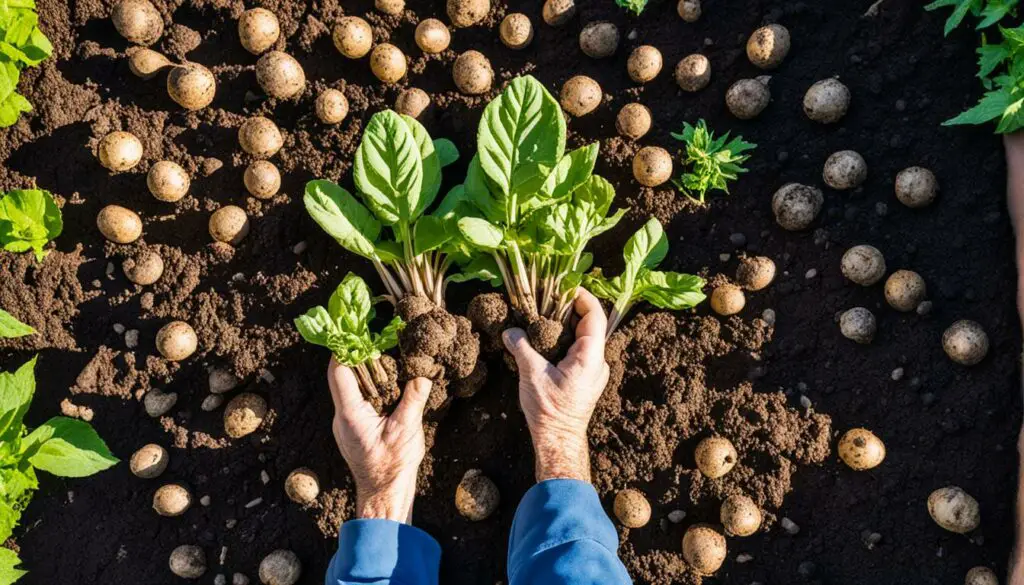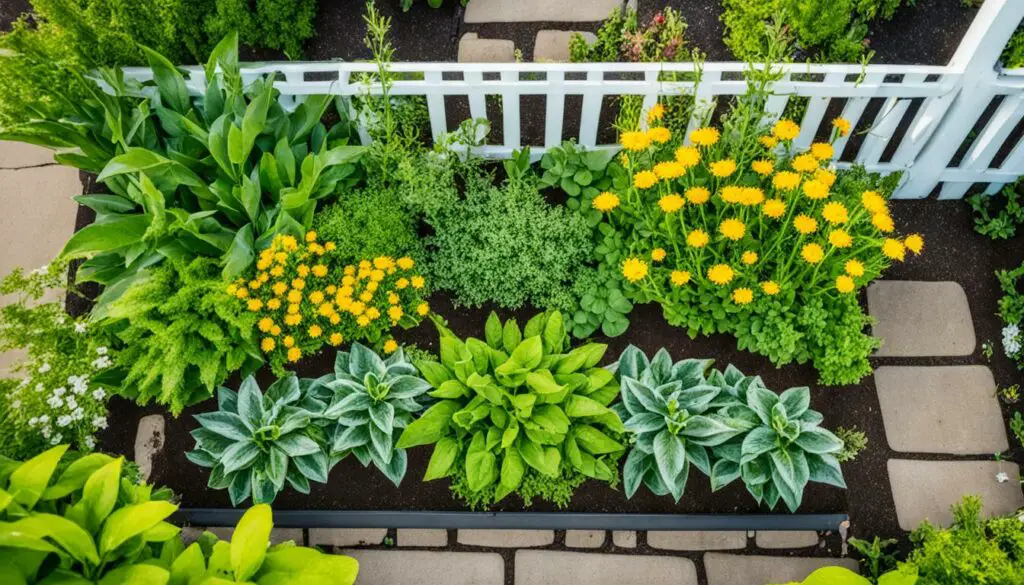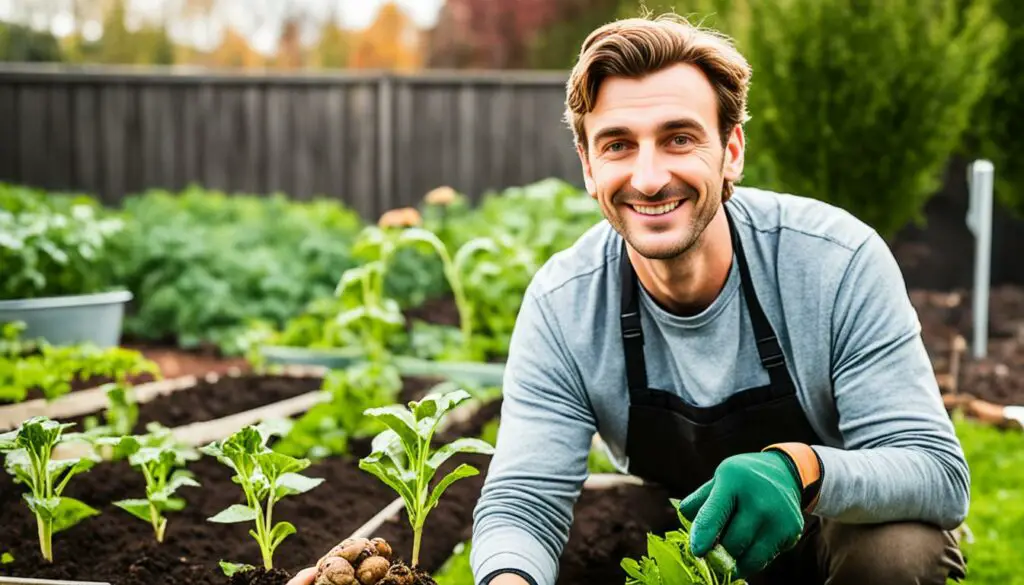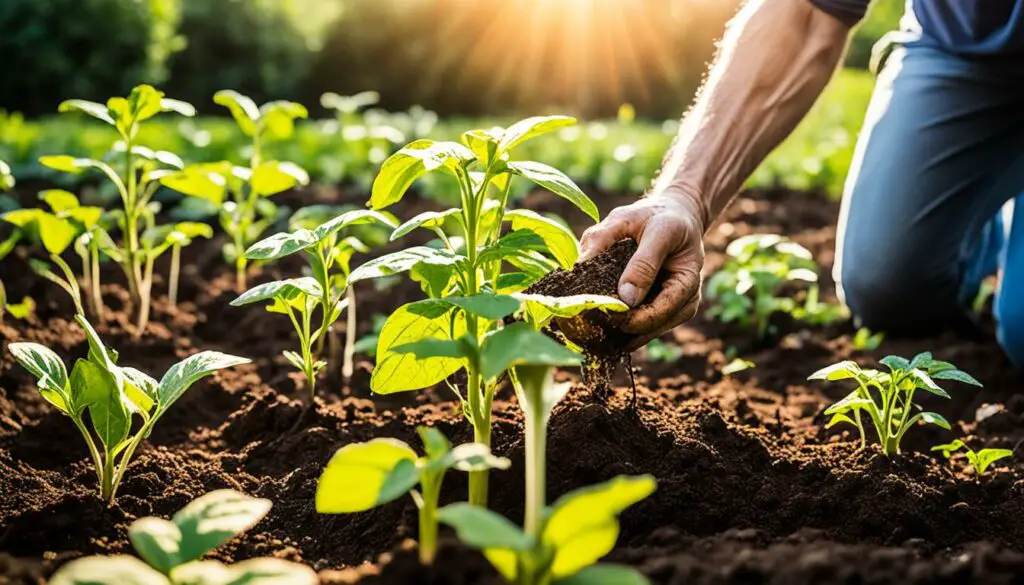Originally posted on February 10, 2024 @ 6:30 pm
Have you ever wondered if you can plant Jerusalem artichokes from the grocery store? The good news is that you can! Jerusalem artichokes, also known as sunchokes, are a versatile and nutritious vegetable that can be easily grown in your own garden. Whether you’ve bought them from a grocery store or farmers’ market, planting store-bought Jerusalem artichokes is a great way to enjoy a bountiful harvest of this delicious and healthy vegetable.
Despite their name, Jerusalem artichokes are not actually from Jerusalem nor are they related to artichokes. They are a type of sunflower native to North America and belong to the Asteraceae family. The edible part of the plant is the tuber, which is underground, and it’s packed with nutrients.
Table of Contents
Key Takeaways:
- Jerusalem artichokes can be planted from store-bought tubers.
- They are not related to globe artichokes but are a type of sunflower.
- The edible part of the plant is the tuber.
- Jerusalem artichokes are nutritious and delicious.
- They can be grown in a variety of soil types and climates.
Understanding Jerusalem Artichokes: Fact vs. Myth

Jerusalem artichokes, also known as sunchokes, are a fascinating vegetable that often sparks curiosity due to their name. Contrary to popular belief, they are not related to globe artichokes but are actually a member of the Asteraceae family. Native to North America, Jerusalem artichokes are versatile plants that adapt well to different soil types and climates. They boast several common names, including sunroots, earth apples, wild sunflowers, or topinambour, which reflect their unique characteristics and historical uses.
Jerusalem artichokes offer not only great taste but also nutritional benefits. Their edible tubers are rich in fiber, potassium, iron, and various vitamins. They can be cooked and enjoyed in a variety of culinary dishes, adding a delightful nutty and sweet flavor. Unfortunately, these fantastic tubers often fly under the radar and are overlooked in grocery stores. Nevertheless, they can be purchased from the store and planted in your own garden, making it possible to grow this fantastic vegetable at home.
Did You Know? Jerusalem artichokes are known by several names, including sunchokes, sunroots, earth apples, wild sunflowers, or topinambour.
The Myth of Jerusalem
Despite the notion that Jerusalem artichokes originate from Jerusalem, their name actually stems from a mispronunciation of the Italian word “girasole,” meaning sunflower. Early European settlers in North America named them “girasole articiocco,” which later transformed into “Jerusalem artichoke.” This confusion led to the misconception that these vegetables came from Jerusalem.
Fun Fact: Jerusalem artichokes are not artichokes either – they are called artichokes due to the similarity in taste to true artichokes.
Jerusalem artichokes are resilient and can grow well in various soil types, including clay, sandy, and loamy soils. They are also drought-tolerant, making them an excellent choice for dry regions. However, they do require full sun to thrive and produce abundant tubers. With their attractive sunflower-like flowers and a wide range of culinary uses, Jerusalem artichokes are truly a gem worth exploring.
Jerusalem Artichoke Varieties
There are several varieties of Jerusalem artichokes available, each with its own unique characteristics. Some varieties may have different tuber shapes, skin colors, and maturation times. Below is a table showcasing some popular Jerusalem artichoke varieties:
| Variety | Tuber Shape | Skin Color | Maturation Time |
|---|---|---|---|
| Sunchoke Supreme | Oval | Reddish-brown | 120-150 days |
| Stampede | Oblong | Brown | 110-140 days |
| Fuseau | Tapered | White to pinkish | 100-130 days |
These varieties, among others, offer a range of options for gardeners to suit their preferences and growing conditions.
Now that we have debunked some of the myths surrounding Jerusalem artichokes and explored their versatility, let’s move on to the next section to discover the benefits of growing these incredible vegetables in your garden.
Benefits of Growing Jerusalem Artichokes

Growing Jerusalem artichokes offers several benefits for both the garden and the kitchen. These plants attract pollinators with their sunflower-like flowers, adding beauty to your garden. The edible tubers are highly nutritious and can be harvested throughout the winter months when other fresh produce may be scarce. Jerusalem artichokes are low-maintenance and virtually pest-free, making them an easy food crop for any garden. They are also adaptable to a wide range of soil types and can come back year after year as a perennial plant.
Jerusalem artichokes are a versatile vegetable that offers numerous health benefits. Rich in dietary fiber, they support digestion and can help regulate blood sugar levels. They are also an excellent source of vitamins and minerals, including potassium, iron, and vitamin C. Incorporating Jerusalem artichokes into your diet can boost your immune system and promote overall well-being.
In addition to their nutritional value, growing Jerusalem artichokes can be a rewarding and cost-effective endeavor. They require minimal care and attention, making them an ideal choice for novice gardeners. With their ability to adapt to different soil conditions and climates, Jerusalem artichokes can thrive in various regions, providing a reliable harvest year after year.
Attracting Pollinators
One of the benefits of growing Jerusalem artichokes is their ability to attract pollinators to your garden. The sunflower-like flowers of these plants are a magnet for bees, butterflies, and other beneficial insects. By including Jerusalem artichokes in your garden, you can create a thriving ecosystem and help support the local pollinator population.
Nutritious Tubers
The edible tubers of Jerusalem artichokes are packed with nutrients and can be a valuable addition to your kitchen. These tubers have a nutty, sweet flavor that can be enjoyed raw or cooked. They can be boiled, roasted, or sautéed, and used in a variety of dishes such as soups, salads, and stir-fries. Incorporating Jerusalem artichokes into your meals can add a unique twist to your culinary creations while boosting their nutritional value.
Low-Maintenance and Pest-Free
Jerusalem artichokes are known for their low-maintenance nature and resistance to pests and diseases. Once planted, they require minimal care, making them an ideal choice for busy gardeners. They are virtually pest-free, reducing the need for chemical interventions. By growing Jerusalem artichokes, you can enjoy a bountiful harvest without the hassle of constant monitoring and maintenance.
Adaptable to Different Soil Types
Jerusalem artichokes are incredibly adaptable to different soil types, making them suitable for a wide range of garden conditions. They can thrive in sandy, loamy, or clay soils, as long as they are well-drained. This adaptability also extends to different climate zones, making Jerusalem artichokes a viable crop in various regions.
| Benefits of Growing Jerusalem Artichokes | Benefits |
|---|---|
| Attracts pollinators | Supports biodiversity in the garden |
| Highly nutritious tubers | Packed with vitamins, minerals, and fiber |
| Low-maintenance and pest-free | Requires minimal care and intervention |
| Adaptable to different soil types | Thrives in various garden conditions |
Planting Jerusalem Artichokes from the Grocery Store

If you’ve ever wondered if you can plant Jerusalem artichokes purchased from the grocery store, the answer is a resounding yes! Planting store-bought Jerusalem artichokes is a convenient and budget-friendly way to start growing this tasty vegetable in your own garden. To help you get started, here are some simple steps to follow and essential soil requirements for successful cultivation.
When purchasing Jerusalem artichokes from the grocery store or farmers’ market, look for individual tubers or pre-packaged bags. Choose varieties with short stolons that cluster the tubers together, as this makes harvesting easier.
To plant Jerusalem artichokes, begin by preparing well-amended soil in a sunny spot in your garden. These plants prefer full sun and well-drained soil with plenty of organic matter. Here’s a step-by-step guide to planting Jerusalem artichokes:
- Create a trench in the prepared soil, around 6 to 8 inches deep.
- Place the Jerusalem artichoke tubers in the trench, spacing them 12 to 18 inches apart.
- Backfill the trench with soil, covering the tubers completely.
- Keep the soil evenly moist, especially during the germination period.
- Mulch the bed with organic matter to help retain moisture and suppress weeds.
Once planted, Jerusalem artichokes will begin to sprout within a few weeks. They can reach heights of up to 10 feet, so make sure to plant them where they have enough space to grow. Regular watering and mulching will help keep the plants healthy and productive.
Table: Soil Requirements for Jerusalem Artichokes
| Soil Aspect | pH Level | Texture | Organic Matter | Water Drainage |
|---|---|---|---|---|
| Well-drained soil | 5.5-7.0 | Loamy, sandy, or clay | Rich in compost or well-rotted manure | Good drainage to prevent waterlogging |
Jerusalem artichokes thrive in various soil types and can tolerate a wide range of conditions. However, providing them with well-drained soil that is rich in organic matter will ensure optimal growth and yield. The pH level should be between 5.5 and 7.0, and the soil texture can be loamy, sandy, or clay. Incorporate compost or well-rotted manure into the soil to increase its fertility and water-holding capacity.
“Planting Jerusalem artichokes from the grocery store is not only a fun gardening project, but it also allows you to enjoy a bountiful harvest of this unique and nutritious vegetable. With just a few simple steps and the right soil conditions, you’ll be on your way to growing your own Jerusalem artichokes in no time!”
With these tips and guidelines, you can confidently plant Jerusalem artichokes from the grocery store and embark on a rewarding gardening journey. Soon, you’ll be able to enjoy the delightful taste and numerous culinary possibilities that come with growing your own fresh Jerusalem artichokes. Happy planting!
Growing and Caring for Jerusalem Artichokes

Jerusalem artichokes, also known as sunchokes, are a hardy perennial plant that thrives in zones 3 to 8. They can be grown from late winter to early spring or planted in the fall for a spring harvest. These versatile plants require an 18- to 20-week frost-free growing period to produce a good-size crop.
Jerusalem artichokes can tolerate partial shade and less favorable soil conditions, although the crop may be smaller. It is important to give them enough space in the garden, as they can grow up to 10 feet tall. Support may be necessary in windy areas to prevent the plants from toppling over.
Regular watering and mulching are essential for the health and productivity of Jerusalem artichokes. They prefer well-drained soil with plenty of organic matter. Ensuring consistent moisture levels will help the plants thrive and produce bountiful tubers.
Whether you are a beginner or an experienced gardener, here are some tips for growing and caring for Jerusalem artichokes:
1. Planting:
Plant Jerusalem artichokes in well-prepared soil with a pH level between 5.8 and 7.0. Dig a trench and space the tubers 12 to 18 inches apart. Ensure that the eyes of the tubers are facing upward. Backfill the trench with soil and water gently. As the plants grow, you can mound soil around the base for added stability.
2. Sunlight:
Provide Jerusalem artichokes with full sun exposure, as they thrive in bright light conditions. However, they can tolerate partial shade, making them suitable for gardens with limited sunlight.
3. Watering:
Keep the soil evenly moist throughout the growing season. Water deeply, allowing the soil to dry slightly between watering sessions. Mulching the bed with organic matter will help retain moisture and suppress weed growth.
4. Fertilization:
Jerusalem artichokes are not heavy feeders and do well with minimal fertilization. However, adding compost or well-rotted manure to the soil before planting can provide additional nutrients for healthy growth.
5. Pest and Disease Control:
Jerusalem artichokes are relatively resistant to pests and diseases. However, regular monitoring for common garden pests such as aphids and slugs is recommended. Apply organic pest control methods if necessary.
6. Harvesting:
The tubers are ready to be harvested when the plants start to die back in late autumn. Dig them up gently using a garden fork, being careful not to damage the tubers. Harvest as needed, as Jerusalem artichokes do not store well once harvested. Leaving them in the ground until you are ready to use them ensures their freshness and flavor.
By following these tips, you can successfully grow and care for Jerusalem artichokes in your own garden. These hardy plants will reward you with a delicious and nutritious harvest year after year.
Harvesting Jerusalem Artichokes
Jerusalem artichokes can be harvested from late autumn through winter. The tubers can be dug up with a garden fork as needed. They do not store well once harvested, so it’s best to leave them in the ground until they are needed. In colder regions, you can cover the ground with mulch to protect the tubers from freezing. Jerusalem artichokes should be harvested before the soil freezes completely. The taste of the tubers improves after frost.
To ensure a good harvest, it’s important to plant Jerusalem artichokes at the right time, typically in late winter or early spring, depending on your climate.
| Harvesting Jerusalem Artichokes | Best Time to Plant Jerusalem Artichokes |
|---|---|
| Dig up tubers with a garden fork | Plant in late winter or early spring |
| Leave harvested tubers in the ground until needed | Harvest before the soil freezes completely |
| Cover the ground with mulch in colder regions | The taste improves after frost |
Common Problems and Solutions
While Jerusalem artichokes are generally healthy and robust plants, there are a few common problems that gardeners may encounter. Here are some solutions to help you overcome these challenges:
1. Invasive Growth
Jerusalem artichokes can become invasive if not controlled. The plant spreads through underground rhizomes and can quickly take over an area of your garden. To prevent this, consider planting varieties with short stolons and harvest the tubers regularly to keep the plant in check.
2. Moisture Levels
Jerusalem artichokes prefer moderate and consistent moisture levels. Avoid over-watering or waterlogged soil, as it can lead to root rot. Ensure that the soil is well-drained and monitor the moisture levels to keep them in the optimal range.
3. Lack of Flowers
In some climates, Jerusalem artichokes may not produce flowers. While the flowers add beauty to the plant, their absence does not affect the development of the tubers. You can still enjoy a bountiful harvest even without the presence of flowers.
4. Flatulence
Jerusalem artichokes contain a carbohydrate called inulin, which some individuals may find difficult to digest, leading to flatulence or bloating. To avoid discomfort, it’s best to introduce Jerusalem artichokes gradually into your diet and consume them in small quantities. This will allow your body to adjust and minimize any potential digestive issues.
By being aware of these common problems and implementing these solutions, you can ensure a successful and enjoyable experience with growing Jerusalem artichokes in your garden.
Where to Buy Jerusalem Artichokes
If you’re interested in planting store-bought Jerusalem artichokes in your garden, there are several sources you can explore. In addition to grocery stores and farmers’ markets, you can find Jerusalem artichoke tubers in seed catalogs and online suppliers. By purchasing tubers from reputable sources, you can ensure the quality and variety of your crop.
When buying Jerusalem artichokes, look for tubers with short stolons. These shorter stems cluster the tubers closer together, making harvesting easier. Additionally, consider your preferences in terms of root shape, skin color, and maturation time to find the perfect variety for your garden.
Here are some reputable sources where you can purchase Jerusalem artichokes:
- Yumheart
- Hudson Valley Seed Company
- Peaceful Valley Farm & Garden
In addition to these sources, you may also be able to obtain Jerusalem artichoke tubers from other gardeners or permaculture enthusiasts in your local community. Sharing and exchanging tubers can be a wonderful way to connect with fellow gardeners and expand your plant collection.
By acquiring high-quality tubers from trusted sources, you can set yourself up for success in growing your own delicious and nutritious Jerusalem artichoke crop. Happy gardening!
Key Takeaways:
- Jerusalem artichokes for planting can be found in grocery stores, farmers’ markets, seed catalogs, and online suppliers.
- Choose tubers with short stolons and look for varieties that suit your preferences in terms of root shape, skin color, and maturation time.
- Reputable sources for purchasing Jerusalem artichokes include Yumheart, Hudson Valley Seed Company, and Peaceful Valley Farm & Garden.
- Consider exchanging tubers with other gardeners or permaculture enthusiasts in your local community.
Conclusion
Planting Jerusalem artichokes from the grocery store is a fantastic option for those looking to grow this nutrient-rich vegetable in their own garden. With their adaptability to different soil types and climates, along with their easy cultivation, Jerusalem artichokes are a valuable addition to any home garden. By following the planting and care tips provided, you can enjoy a bountiful harvest of these delicious tubers for years to come. So why not give growing Jerusalem artichokes a try and experience the numerous benefits they have to offer? Happy gardening!
FAQ
Can I plant Jerusalem artichokes from the grocery store?
Yes, you can plant Jerusalem artichokes that you’ve purchased from the grocery store. They are a hardy perennial vegetable that can be grown in your own garden.
How do I grow Jerusalem artichokes?
Jerusalem artichokes are easy to grow. You can plant the tubers directly in your garden in well-amended soil. They prefer full sun and well-drained soil with plenty of organic matter.
What are the best soil requirements for Jerusalem artichokes?
Jerusalem artichokes thrive in various soil types, but they prefer well-drained soil with plenty of organic matter. They can adapt to less favorable soil conditions, although the crop may be smaller.
When is the best time to plant Jerusalem artichokes?
Jerusalem artichokes can be planted from late winter to early spring, or in the fall for a spring harvest. They need an 18- to 20-week frost-free growing period to produce a good-size crop.
How do I harvest Jerusalem artichokes?
Jerusalem artichokes can be harvested from late autumn through winter. The tubers can be dug up with a garden fork as needed. It’s best to leave them in the ground until they are needed as they do not store well once harvested.
What are the common problems and solutions when growing Jerusalem artichokes?
Jerusalem artichokes are generally healthy and robust plants, but they can become invasive if not harvested regularly. They prefer moderate and consistent moisture levels, so avoid waterlogged soil.
Where can I buy Jerusalem artichokes for planting?
Jerusalem artichokes can be purchased from grocery stores, farmers’ markets, and online suppliers. Some reputable sources include Yumheart, Hudson Valley Seed Company, and Peaceful Valley Farm & Garden.
What are the benefits of growing Jerusalem artichokes?
Growing Jerusalem artichokes offers several benefits. They attract pollinators to your garden, yield highly nutritious tubers, and are low-maintenance and virtually pest-free. They can also adapt to different soil types and come back year after year as a perennial plant.
Can I use Jerusalem artichokes purchased from the store in my garden?
Yes, you can use Jerusalem artichokes purchased from the store to plant in your own garden. They are a great way to grow your own crop of this delicious and nutritious vegetable.
Source Links
- https://www.gardenbetty.com/jerusalem-artichokes-sunchokes/
- https://www.rhs.org.uk/vegetables/jerusalem-artichokes/grow-your-own
- https://gardenate.com/plant/Jerusalem Artichokes?zone=100
See also:
Leave a Reply